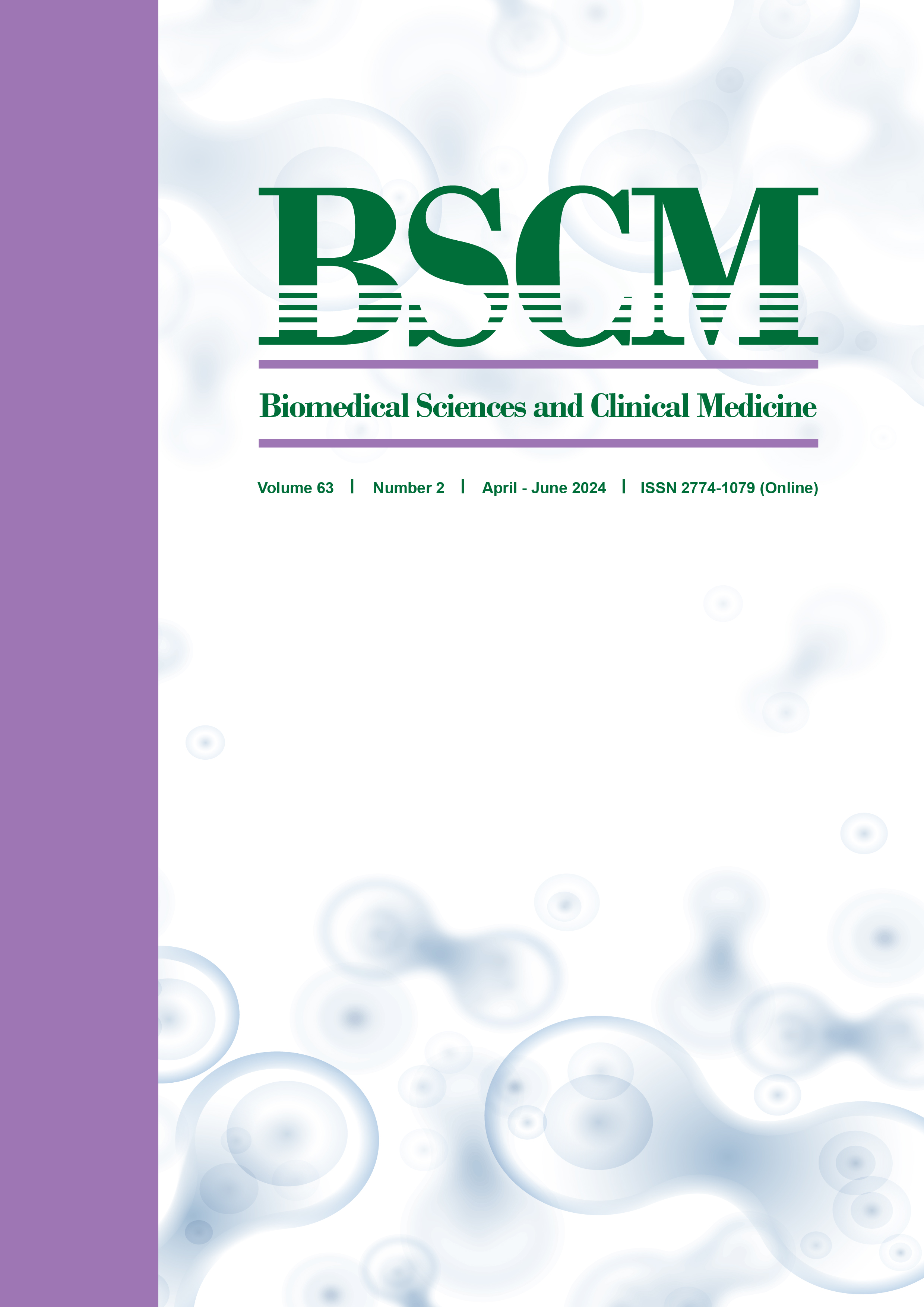Assessment of second trimester genetic amniocentesis: 6 years experiences at Sanpatong hospital
Keywords:
Amniocentesis, Second trimester, Genetic, Chromosome abnormalitiesAbstract
OBJECTIVE This study aims to assess the indications, complications, and outcomes of second-trimester genetic amniocentesis performed at Sanpatong Hospital, Chiang Mai, Thailand.
METHODS A cross-sectional descriptive study analyzed data collected from high-risk pregnant women who underwent second-trimester genetic amniocentesis at Sanpatong Hospital between October 1st, 2016 and September 30th, 2022. The data include indications for the procedure, complications, and pregnancy outcomes.
RESULTS A study of 451 women with high-risk pregnancies who underwent amniocentesis found that the most common indications for second trimester genetic amniocentesis were advanced maternal age (49.4%) and a high-risk Quad test (49.4%). Abnormal chromosomes were detected in 3.1% of cases, with aneuploidy the most common type (2.1%), primarily
trisomy 21 (1.3%). The overall aspiration success rate was 100%. The only complications related to the procedure were pelvic pain (0.6%) and placental hematoma (0.2%). There were no fetal losses within 30 days after amniocentesis. The culture failure rate was 1.1%. Pregnancy outcomes included preterm delivery (12.3%) and normal term delivery (87.7%).
CONCLUSIONS Performing second trimester genetic amniocentesis at Sanpatong Hospital, a mid-level secondary hospital, over a six-year period resulted in no fetal losses.
References
Cunningham F.G, Lenovo K.J, Bloom S.L, Dashe J.S, Hoffman B.L, Casey B.M, et al. Prenatal diagnosis. in William obstetric. New York: McGraw-Hill; 2018:438-9.
American College of Obstetricians and Gynecologists’ Committee on Practice Bulletins—Obstetrics, Committee on Genetics, Society for Maternal–Fetal Medicine. Practice Bulletin No. 162: prenatal diagnostic testing for genetic disorders. Obstet Gynecol. 2016;127(5):e108–e122.
Fuchs F, Riis R. Antenatal sex determination. Nature. 1956;177:330.
Steele MW, Berg WR. Chromosome analysis of human amniotic cell. Lancet. 1996;1:383.
Borgida A, Mill A, Feldman D, Rodis J, Egan J. Outcome of pregnancies complicated by ruptured membranes after amniocentesis. Am J Obstet Gynecol. 2000;183:937-9.
Theodora M, Antsaklis A, Antsaklis P, Blanas K, Daskalakis G, Sindos M, et al. Fetal loss following second trimester amniocentesis. Who is at greater risk? How to counsel pregnant women? J Matern Fetal Neonatal Med. 2016;29(4):590-5.
Salomon L.J, Sotiriadis A, Wulff C.B, Odibo A. Akolekar R. Risk of miscarriage following amniocentesis or chorionic villus sampling: systematic review of literature and updated meta-analysis. Ultrasound Obstet Gynecol 2019; 54: 442–451.
Suwanrath C, Kor-anantakul O, Leethanaporn R, Suntharasaj T, Liabsuethakul T, Ratanaprueksachat R. Genetic Amniocentesis: 10 years experience at Sonkhlanakarind Hospital. Thai J Obstet Gynaecol. June 1999, Vol. 11, 105-109.
Ratanasiri T, Komwilaisak R, Temtanakitpaisan T, Luengwattanawanit S, Prasertcharoensuk W, Saksiriwuttho P, et al. Second Trimester Genetic Amniocentesis: Khon Kaen University 14-year experience. Thai J Obstet Gynaecol. JULY 2011, Vol. 19, 105-111.
Pathompanitrat S, Choochuay P, Wannawat N. Second Trimester Genetic Amniocentesis at Secondary Center Hospital in Southern Thailand. Thai J Obstet Gynaecol. October 2013, Vol. 21, 134-140.
Wanapirak C, Piyamongikol W, Sirichotiyakul S, Tongprasert F, Srisupundit K, Luewan S, et al. Fetal Down syndrome screening models for developing countries; Part I: Performance of Maternal serum screening. BMC Health Serv Res. 2019 Nov 27;19(1):898.
Lam Y.H, Tang M.H, Sin S.Y, Ghosh A. Clinical significance of amniotic-fluid-cell culture failure. Prenat Diagn. 1998 Apr;18(4):343-7.
Reid R, Sepulveda W, Kyle P.M, Davies G. Amniotic fluid culture failure: clinical significance and association with aneuploidy. Obstet Gynecol. 1996 Apr;87(4):588-92.
Reece E.A.. Early and midtrimester genetic amniocenteses. Safety and outcomes. Obstet Gynecol Clin North Am. 1997 Mar;24(1):71-81.
Müngen E, Tütüncü L, Muhcu M, Yergök Y.Z. Pregnancy Outcome Following Second-Trimester Amniocentesis: A Case-Control Study. Am J Perinatol 2006;23(1):25-30.
Chaksuwat P, Wanapirak C, Piyamongikol W, Sirichotiyakul S, Tongprasert F, Srisupundit K, et al. A comparison of pregnancy outcomes after second-trimester amniocentesis between cases with penetration of the placenta and nonpenetration. J Matern Fetal Neonatal Med. 2021 Dec;34(23):3883-8.











